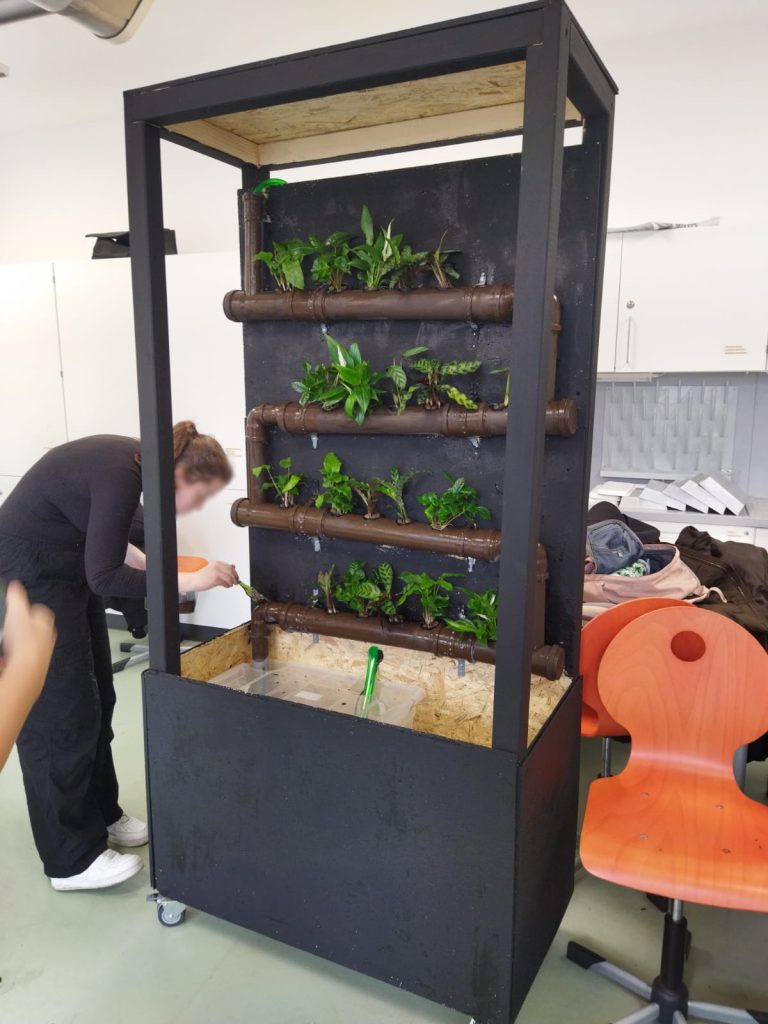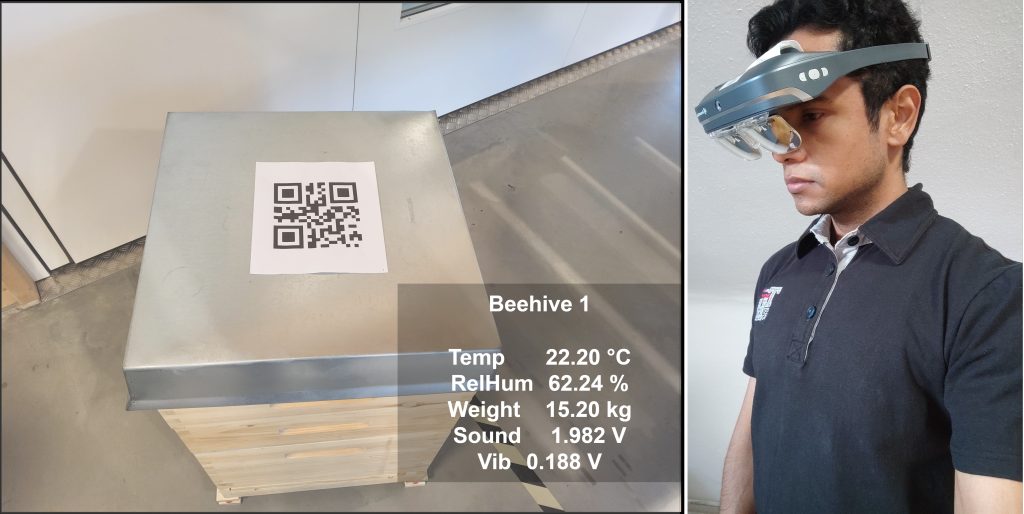With the “FabLab Kamp-Lintfort REACTS” project, students are introduced to processes and practical skills in digital manufacturing. The focus is on two workshop offerings: DigiBee, the digitalization of beekeeping, and Green Wall, instructions for building planted wall modules for classrooms. Thanks to the equipment supported by ERDF funds, the FabLabs at Rhine-Waal University of Applied Sciences are able to offer these workshops in both face-to-face and hybrid or completely distance formats.
1) Green Wall: How do temperature and air quality affect student learning outcomes? Invitation to take part in a self-experiment
Sensor Box
In this workshop, students will build 4 identical sensor boxes that will then be installed in 4 classrooms. One of these classrooms will be equipped with a green wall to measure its influence.
Duration: 8 hours, 1 day
Number of participants: 8 – 12 pupils (2 – 3 per sensor box)
Timeframe: June – September
Requirements: power outlet available
Activities:
- Wiring and connecting the electronic components
- Programming the sensors
- Making of the external box containing the sensors
- Visualization of the sensor readings
Green Waal
In this workshop, students will build and install a hydroponic green wall under the guidance of a teacher, with support from the Green FabLab. We will provide detailed instructions for the building.

Dimensions in cm: 100 x 200 x 50 (w x h x d)
Duration: 8 hours, 1 day
Number of participants: 5 – 12 pupils (5 – 6 per green wall)
Timeframe: August – September
Requirements: power outlet, replenishment of water and nutrients at regular intervals (signaled by a sensor)
Activities:
- Assembly of the frame
- Creating a gravitationally driven water flow
- Transplanting the plants into the hydroponic system
- Installation of sensors
Data obtained from the sensor box will be used in a comparative analysis to determine
the contribution of a green wall and other parameters in classrooms on student learning
performance. As assessment parameters it will be used a self-assessment wellness
meter, the results of a logic quiz, or the average scores of learning assessments (by
prior arrangement). All data will be collected anonymously, will not be used for any other
purposes than those stated, and will not be passed on to third parties.
2) DigiBee: Digitization of beekeeping as a test bed for remote sensing, Augmented Reality, and Artificial Intelligence
The role of bees
Bees provide us with honey, propolis, royal jelly, and beeswax. They also help pollinate many plants – without them, fruit and vegetable production on the current scale and to feed an ever-growing world population is not possible. About a third of all the plants we eat are pollinated by bees.
There are around 20,000 species of bees worldwide, around 500 of which are in Germany. However, we only have one species that produces honey: our honey bees. A honey bee produces about a twelfth of a teaspoon of honey in its lifetime, so it takes about 2,400 bees to produce one kilogram of honey.
There are three different “jobs” a honey bee can have: worker, queen, and drone. Only the drones are male – they mate with the unfertilized queen but do not help pollinate plants or collect pollen or nectar.
About the work of a beekeeper
Every beehive or colony of bees needs a queen. Without a queen, workers can no longer grow because they require fertilized eggs. Therefore, the beekeeper must ensure that there is always a healthy queen in the hive.
A beekeeper is, so to speak, the “bee manager” and in this role has to ensure that the bee colony is doing well – for example, that there is enough food in winter. It must also be ensured that the colony is not infested with parasites or attacked by other insects. At the Green FabLab, we want to support beekeepers in their important work using modern methods.
What do we do in the Green FabLab?
We help beekeepers with their work…
How do we do that?
Thanks to a sensor system we installed, a beekeeper does not have to constantly check the hives to see whether the bees are doing well. Instead, if a problem occurs, he/she receives a message on the smartphone, can determine the cause of the problem, and fix it at the next visit.
The so-called remote monitoring of beehives has been around for a long time. In the Green FabLab, however, we go even further: we train a system with artificial intelligence that provides the beekeeper with information about what problem has occurred in the hive – the problem can then be remedied in a targeted manner. Not only that, we use Augmented Reality technology by using data glasses (AR glasses): when the beekeeper wears the glasses, he/she can get information about all beehives.

Some beekeepers own several hundred hives; Beekeepers cannot take notes or read up on past events while working with honey-sticky hands – whether on a cell phone or on paper. Instead, the QR code of the respective beehive is scanned by the data glasses, which then provide information about the history of the respective beehive via an information window.
